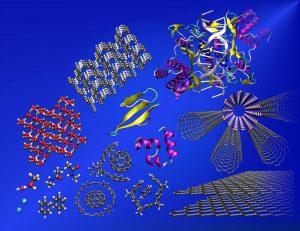 Simulating very large quantum systems require new numerical methods and algorithms. Such simulations indeed lead to solving linear and nonlinear systems of equations and eigenvalue problems, that are characterized by high dimensionality, large ranks (for tensor problems), and extreme scale. They must exploit massive parallelism in both space and time and rank-reduction methods, through deterministic or stochastic approaches, optimized data structures, and minimize communication. It is also key to have tools at hands to assess the quality of the simulation results. Error analysis is of major relevance in the simulation of quantum systems, but to date, it has received less attention than in other fields such as fluid or structure dynamics. The error between the exact and computed values of a given physical quantity of interest (QOI), e.g. the dissociation energy of a molecule, has several origins: a model error (resulting from the choice of a computationally tractable, but not extremely accurate, model, e.g. Kohn-Sham with B3LYP functional), a discretization error (resulting from the choice of a finite basis set), an algorithmic error (due to the choice of stopping criteria in Self-Consistent Field and other iterative algorithms), an implementation error (due to possible bugs or uncontrolled round-off errors), a computing error (due to random hardware failures). Quantifying these different sources of errors is key for two reasons. First, guaranteed estimates on these five components of the error would allow one to supplement the computed value of the QOI returned by the numerical simulation with guaranteed error bars (certification of the result). Second, this would allow one to choose the parameters of the simulation (approximate model, discretization parameters, algorithm and stopping criteria, data structures?) in an optimal way in order to minimize the computational effort required to reach the target accuracy (error balancing). Since molecular simulation consumes a massive amount of CPU time in scientific research centers worldwide, this would have a major impact on the use of scientific computing resources.
Simulating very large quantum systems require new numerical methods and algorithms. Such simulations indeed lead to solving linear and nonlinear systems of equations and eigenvalue problems, that are characterized by high dimensionality, large ranks (for tensor problems), and extreme scale. They must exploit massive parallelism in both space and time and rank-reduction methods, through deterministic or stochastic approaches, optimized data structures, and minimize communication. It is also key to have tools at hands to assess the quality of the simulation results. Error analysis is of major relevance in the simulation of quantum systems, but to date, it has received less attention than in other fields such as fluid or structure dynamics. The error between the exact and computed values of a given physical quantity of interest (QOI), e.g. the dissociation energy of a molecule, has several origins: a model error (resulting from the choice of a computationally tractable, but not extremely accurate, model, e.g. Kohn-Sham with B3LYP functional), a discretization error (resulting from the choice of a finite basis set), an algorithmic error (due to the choice of stopping criteria in Self-Consistent Field and other iterative algorithms), an implementation error (due to possible bugs or uncontrolled round-off errors), a computing error (due to random hardware failures). Quantifying these different sources of errors is key for two reasons. First, guaranteed estimates on these five components of the error would allow one to supplement the computed value of the QOI returned by the numerical simulation with guaranteed error bars (certification of the result). Second, this would allow one to choose the parameters of the simulation (approximate model, discretization parameters, algorithm and stopping criteria, data structures?) in an optimal way in order to minimize the computational effort required to reach the target accuracy (error balancing). Since molecular simulation consumes a massive amount of CPU time in scientific research centers worldwide, this would have a major impact on the use of scientific computing resources.
Hybrid Workshop: While this workshop is offered in-person, participants can also register and attend talks virtually. Register here.
This workshop will include a poster session; a request for posters will be sent to registered participants in advance of the workshop.
Giulia Galli
(University of Chicago)
Laura Grigori
(Institut National de Recherche en Informatique Automatique (INRIA))
Lin Lin
(University of California, Berkeley (UC Berkeley))
Yvon Maday
(Université de Paris VII (Denis Diderot) et Université de Paris VI (Pierre et Marie Curie))